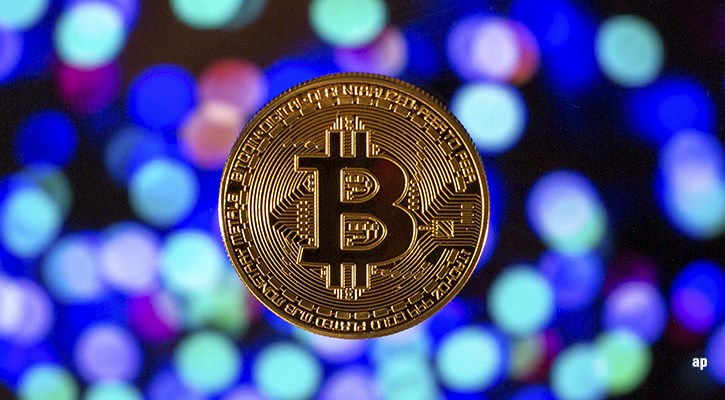
Our relationship with the money we earn, spend and save is changing rapidly. Shops are refusing to accept cash, inflation is rising, cryptocurrencies are gaining momentum and governments across the world have mountains of debt. This month, central America country El Salvador even started accepting Bitcoin as legal tender. Meanwhile, the Bank of England is considering launching its own digital currency, dubbed "Britcoin".
In times of financial stress, historically investors have bought gold - a store of value and means of exchange for thousands of years. But does the precious metal still serve its purpose as an investment insurance policy? Crypto enthusiasts claim that Bitcoin is the new “digital gold”, a modern currency and investment for the technological age. Let's take a look:
Inflation Protection
Inflation is on the march again as economic output cranks up after last year’s lockdowns. Gold usually shines in this environment. “Crypto is not there to measure your loss of purchasing power, which gold is there to do,” says Jupiter’s head of gold and silver strategy, Ned Naylor-Leyland.
Morningstar’s Alex Bryan says that gold’s track record as an inflation hedge is not flawless, but it’s enough that investors still think the link is still a solid one. “Gold is clearly not a perfect inflation hedge, though it can help boost returns in inflationary periods,” he says. Gold has headed back up to $1,900 in recent months as inflation fears have risen. In contrast, “the trading history of Bitcoin is too short and volatile to provide any evidence of a link with inflation,” says AJ Bell analyst Laith Khalaf.
Winner: Gold
Diversification/Safe Haven
Gold is often the go-to safe haven asset at times when the global system is under stress. In the 2020 sell-off, for example, the gold price spiked above $2,000 an ounce for the first time. In contrast, Bitcoin “hasn't held up particularly well during periods of market crisis”, says Morningstar analyst Amy Arnott.
Crypto’s first proper test as an alternative asset class came in the February-March crash in 2020. The asset fell around 40% in that volatile month, a similar level to the US stock market. “In contrast to gold, crypto has exceptionally high volatility but also high correlation to risk assets, which means it has dubious investment diversification benefits, even if it had any positive fundamental value,” says Barry Norris, fund manager at Argonaut Capital.
Winner: Gold
Scarcity
An ounce of gold costs around £1,350, a high price for a small quantity of metal. The reason? Scarcity. Most of the world’s gold deposits have already been dug up and big discoveries are getting rarer, despite the best efforts of mining companies. The fact that there's a finite amount of gold makes it valuable.
But this is also where crypto can play its trump card. There are only 21 million Bitcoins in existence and (in theory) no more can be mined. However, new coins like Dogecoin appear all the time and can be created out of thin air. Those mining Bitcoin could technically change the rules in future and create more. “Crypto is in fact so easy to produce that almost anyone can have a go at ‘free money’” says Norris.
Winner: Draw
Volatility/Speculation
Crypto’s strong price movements are a good fit for technical traders, says Morningstar Investment Management’s Mark Preskett. But this undermines the argument that it can be a safe haven as well as an investment. “99% of all transactions are entirely speculative,” adds Argonaut’s Norris, and the main financial beneficiaries of all those transactions are crypto exchanges, which take a cut of every trade.
Looking back over the last 50 years, gold has traded between $100 and $2,000. That sort of increase is decent over the long-term but isn’t going to make you an overnight millionaire. In the past six years, Bitcoin has traded between $300 and its recent peak of $60,000 in April, and since then it’s fallen sharply. Daniel Masters, executive chairman of crypto platform CoinShares, says that Bitcoin’s volatility means that it’s not for everyone. “With any volatile asset you need to be experienced and careful,” he says.
Winner: Gold
Usefulness/Means of Exchange
We’re calling this a no-score draw. In theory, gold has real-world applications, from industry to jewellery, but can you spend it in everyday situations? The Bank of England says gold coins are technically “legal tender”, but that doesn’t mean a shopkeeper is obliged to accept them or that you can pay bills or taxes with it. Some gold ETFs are linked to physical assets but are not the real thing; even those who own real gold bars prefer to store them in vaults, for obvious reasons.
Crypto has moved into the mainstream but its acceptance is low (apart from in El Salvador). Even Tesla rapidly backtracked on accepting Bitcoin as payment for electric cars. Bitcoin is a currency, but why would you spend the notes in your wallet if you thought they could double in value by the end of the year? "The volatility of cryptocurrency makes it impossible to price items or be used as a unit of account," says Norris.
Winner: Neither
ESG
The yellow metal wins this by default. Tesla’s objection to owning Bitcoin was an environmental one because of the energy used in mining the coins - indeed, its been estimated that Bitcoin uses more electricity in a year than the whole of Argentina. “Consumers and investors may start to shun cryptocurrency, when they discover it’s an environmental deadweight, particularly younger Bitcoin fans who are also likely to be sensitive to climate issues,” says AJ Bell’s Khalaf.
Mining companies are not above reproach, of course, but as most the world’s gold is already out of the ground, storing and trading it is unlikely to add much to its carbon footprint.
Winner: Gold (on a technicality)
The Best of Both Worlds?
So far, gold appears to have the upper hand over crypto in these opening rounds, but there are signs that the two assets could co-exist in the financial system of the future.
It's been suggested that so-called “stablecoins” could be the asset class to bridge the gap between disruptive digital currencies and the financial status quo. These are purely digital assets but are linked to the value of stable reserve assets like the US dollar or gold. Central bankers are getting wise to the threat and opportunities of digital currencies and are quickly moving into the territory. The Bank of England’s plans for a Central Bank Digital Currency (CBDC) are an example of stablecoin, although these are at an early stage. These digital banknotes would be backed by the value of sterling, which should render them safe - though it's worth pointing out that this stability means they won't appeal to crypto speculators.
CoinShares' Masters says companies like Facebook, Google and Amazon are the ones to watch in this space because of their billions of users and existing investment in technical infrastructure. Facebook's digital coin Diem is expected to launch this year and Masters thinks this will "provide the functionality gold used to have" when it was first used as a medium of exchange thousands of years ago.
For now, investors are likely to continue buying gold and crypto - and in the near future, a digital hybrid of the two. "Digital currencies are likely here to stay, at least in some form," says Morningstar's Susan Dziubinski in her guide to all things crypto.
©2021 Morningstar. All rights reserved. The information, data, analyses and opinions presented herein do not constitute investment advice; are provided as of the date written, solely for informational purposes; and subject to change at any time without notice. This content is not an offer to buy or sell any particular security and is not warranted to be correct, complete or accurate. Past performance is not a guarantee of future results. The Morningstar name and logo are registered marks of Morningstar, Inc. This article includes proprietary materials of Morningstar; reproduction, transcription or other use, by any means, in whole or in part, without prior, written consent of Morningstar is prohibited. This article is intended for general circulation, and does not take into account the specific investment objectives, financial situation or particular needs of any particular person. Investors should consult a financial adviser regarding the suitability of any investment product, taking into account their specific investment objectives, financial situation or particular needs, before making any investment decisions. Morningstar Investment Management Asia Limited is licensed and regulated by the Hong Kong Securities and Futures Commission to provide investment research and investment advisory services to professional investors only. Morningstar Investment Adviser Singapore Pte. Limited is licensed by the Monetary Authority of Singapore to provide financial advisory services in Singapore. Either Morningstar Investment Management Asia Limited or Morningstar Investment Adviser Singapore Pte. Limited will be the entity responsible for the creation and distribution of the research services described in this article.









:quality(80)/cloudfront-us-east-1.images.arcpublishing.com/morningstar/MNPB4CP64NCNLA3MTELE3ISLRY.jpg)

.png)









